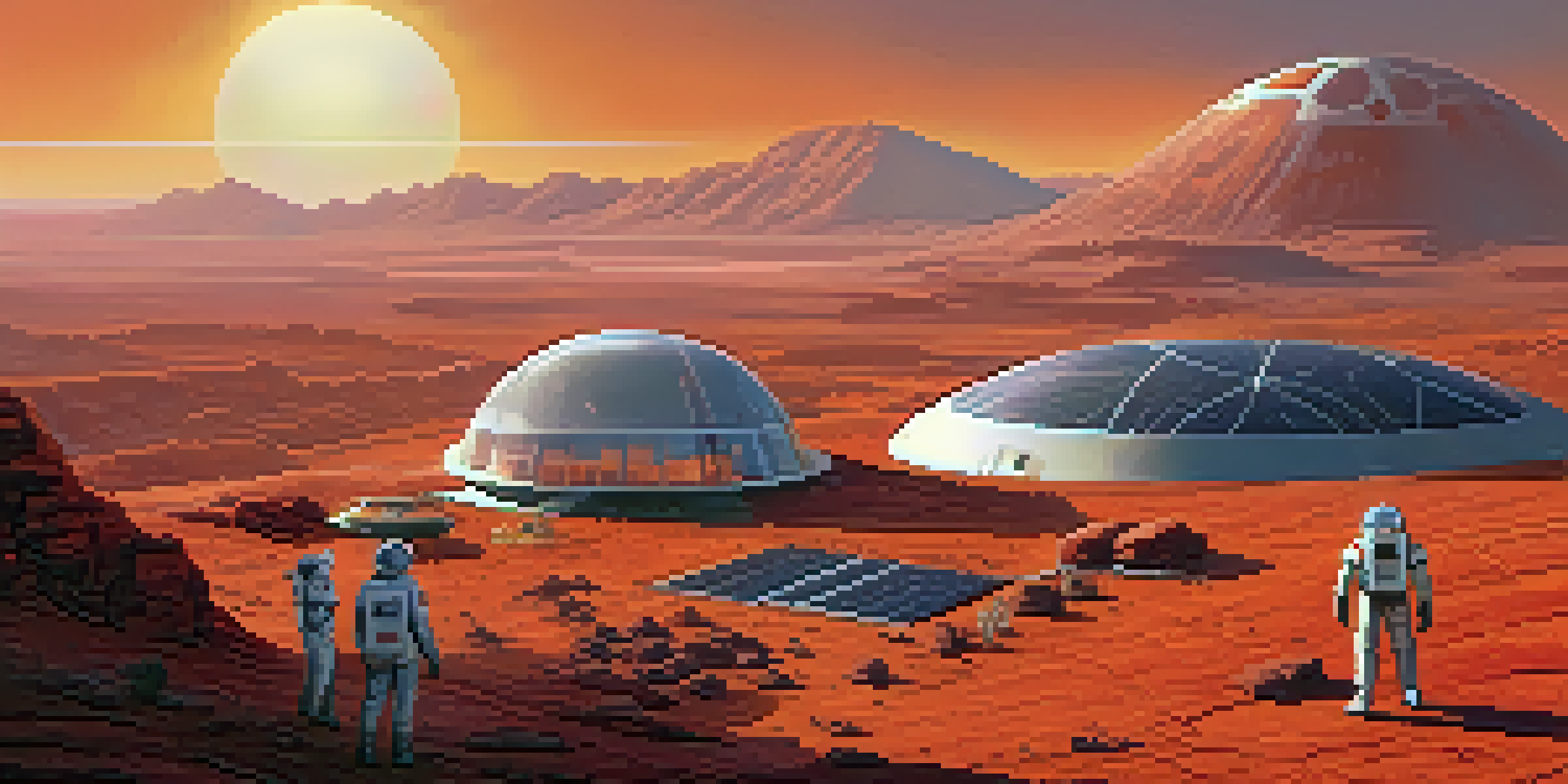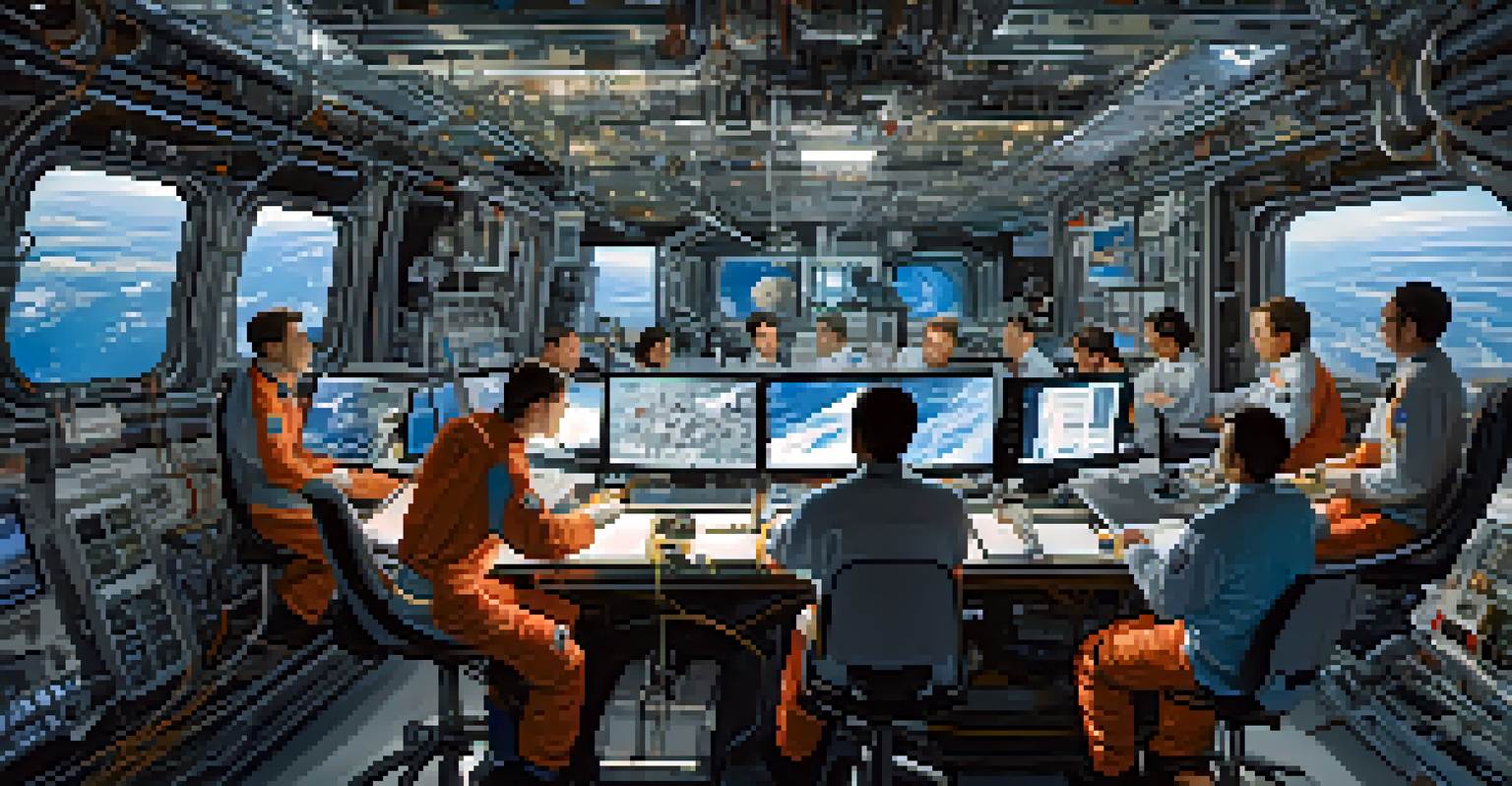The Importance of Space Exploration for Humanity

Understanding the Universe: Our Quest for Knowledge
Space exploration has always been about our innate curiosity to understand the cosmos. From the ancient Greeks gazing at stars to today's advanced telescopes, humans have a rich history of seeking knowledge about the universe. Each mission, like the Hubble Space Telescope, reveals breathtaking discoveries that deepen our understanding of phenomena such as black holes and distant galaxies.
Space exploration is a force of nature unto itself that no other force in society can rival.
These discoveries not only satisfy our curiosity but also inspire future generations of scientists and explorers. Think about the excitement a child feels when they see images of Mars or Saturn; it can spark a lifelong passion for science and space. This thirst for knowledge drives advancements in technology and science that benefit life on Earth.
Moreover, understanding the universe can lead to practical benefits, such as improving our navigation systems and predicting space weather, which can affect our satellites and power grids. In essence, every mission into space is a step toward unraveling the mysteries of existence, linking us more closely to the universe around us.
Technological Innovations: Spurring Progress on Earth
Space exploration has historically been a catalyst for technological innovation. Innovations developed for space missions, such as satellite technology, have found their way into everyday life, improving communication, weather forecasting, and even search-and-rescue operations. For instance, GPS technology, which many of us rely on daily, was initially developed for navigation in space.

Additionally, the demands of long-duration space missions have led to advancements in materials science, robotics, and healthcare. Think of the remote monitoring systems used by astronauts; many of these technologies are now applied in telemedicine, allowing doctors to care for patients from afar. This cross-pollination of ideas exemplifies how space exploration can directly impact life on Earth.
Curiosity Drives Space Exploration
Humanity's innate curiosity about the cosmos fuels advancements in technology and inspires future generations of scientists.
The economic benefits are also noteworthy. The stimulating effect of space exploration on various industries can lead to job creation and economic growth. As private companies enter the space race, like SpaceX and Blue Origin, they open new avenues for innovation and investment, further intertwining space exploration with our daily lives.
Inspiring Global Collaboration: Uniting Nations
Space exploration fosters international cooperation, bringing together countries with a shared vision. The International Space Station (ISS) is a prime example of how nations can collaborate on ambitious goals, pooling resources, knowledge, and expertise. This unity in the face of a common challenge promotes peace and understanding among nations.
The important achievement of Apollo was demonstrating that humanity is not forever chained to this planet and our visions go rather further than that.
When countries work side by side on projects like the Mars rover missions or lunar exploration, they create bonds that can transcend political differences. This collaborative spirit not only enhances scientific output but also cultivates a sense of global citizenship. It reminds us that we share a planet, and ultimately, a universe.
Moreover, as we face global challenges like climate change, international collaboration inspired by space exploration can lead to innovative solutions. By sharing knowledge and resources, countries can tackle problems that affect us all, proving that working together can yield tremendous benefits for humanity.
Planetary Defense: Protecting Earth from Cosmic Threats
One of the critical reasons for space exploration is planetary defense. With asteroids and comets constantly zipping through our solar system, understanding their trajectories and potential threats to Earth is paramount. Missions like NASA's DART (Double Asteroid Redirection Test) are crucial in developing strategies to deflect hazardous objects.
The threat of a catastrophic impact is real, but proactive efforts in space exploration can help mitigate that risk. By tracking near-Earth objects, scientists can provide timely warnings and develop response strategies, ensuring the safety of our planet. This kind of preparation is vital for future generations.
International Collaboration in Space
Space exploration promotes global cooperation, allowing nations to work together toward common scientific goals and fostering peace.
Furthermore, the technologies developed for planetary defense often have additional applications, such as improving our understanding of climate change and natural disasters. By studying other celestial bodies, we can gain insights into Earth’s processes, enhancing our ability to protect our home.
The Search for Life: Expanding Our Horizons
The quest for extraterrestrial life is one of the most exciting aspects of space exploration. Missions to Mars, the moons of Jupiter, and the exoplanets beyond our solar system aim to answer fundamental questions about life's existence outside Earth. Discovering microbial life on Mars, for instance, would revolutionize our understanding of biology and our place in the universe.
This search not only fuels scientific inquiry but also taps into our deepest philosophical questions. Are we alone in the universe? What does it mean to be human in a cosmos filled with potential life? These inquiries can shift our perspective and deepen our appreciation for life on Earth.
Moreover, the technologies developed during the search for life, such as advanced imaging and analytical techniques, often find applications in other fields, including medicine and environmental science. The ripple effects of these explorations can lead to unexpected breakthroughs that enhance our understanding of life itself.
Sustainability: Learning from Space for Earth’s Future
Space exploration provides a unique vantage point for understanding our planet's environmental challenges. Observations from space can monitor climate change, deforestation, and natural disasters, offering invaluable data for scientists and policymakers. By studying Earth from above, we can gain insights into how to better manage our resources and protect our environment.
Additionally, the practices developed in space exploration, such as recycling and resource management, can be adapted to enhance sustainability on Earth. For example, the closed-loop life support systems used on the ISS can inform waste reduction strategies in urban settings, promoting sustainable living.
Space Insights for Earth's Future
Exploring space provides valuable data to address environmental challenges on Earth, enhancing sustainability and resource management.
As we venture out into space, we learn not only about the universe but also about the fragility of our planet. This realization can inspire a collective effort to prioritize sustainability, ensuring that we take care of Earth while we explore beyond it.
Preparing for the Future: Ensuring Humanity's Survival
As our planet faces challenges like overpopulation, resource depletion, and climate change, space exploration offers potential solutions for humanity's survival. Colonizing other planets or moons, such as Mars or the Moon, could serve as a safety valve for our growing population and dwindling resources. While this may sound like science fiction, advancements in technology are making this a tangible goal.
Moreover, establishing a permanent human presence beyond Earth could ensure the survival of our species. In the event of a global catastrophe, having a foothold on another planet could provide a backup for humanity. This idea drives many space programs and inspires young individuals to pursue careers in science and engineering.

Ultimately, the pursuit of space exploration is about expanding our horizons and securing a future for generations to come. By investing in our exploration of the cosmos, we invest in our legacy, ensuring that humanity continues to thrive, no matter the challenges we face on our home planet.